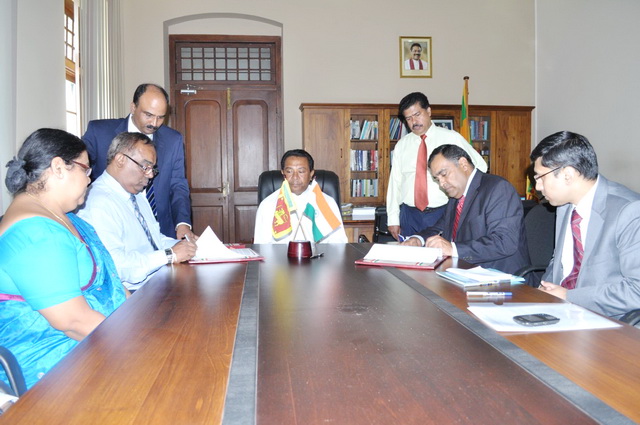INDIA TO ASSIST THE FACULTY OF AGRICULTURE AND ENGINEERING AT KILINOCHCHI
The Government of India is happy to announce a partnership with the Government of Sri Lanka to assist in the setting up of a Faculty of Agriculture and a Faculty of Engineering for the University of Jaffna at Kilinochchi. A Memorandum of Understanding between the two Governments for the implementation of this project was signed on 14 July 2014 between the High Commissioner of India, Mr. Y.K. Sinha, and the Secretary to the Ministry of Higher Education, Dr. Sunil Jayantha Nawaratne, in the presence of Hon’ble S.B.Dissanayake, Minister of Higher Education, Government of Sri Lanka and Ms. Vasanthy Arasaratnam, Vice-Chancellor of the University of Jaffna.
As part of the project, the Government of India will set up the physical infrastructure for the two Faculties. These include lecture halls, a conference hall, computer laboratory, library, and sports complex for the Faculty of Agriculture, and lecture halls, a conference hall, laboratories, administrative office and staff room for the Faculty of Engineering. The estimated cost of these facilities is SLR 600 million, which will be provided through grant assistance.
In addition to the physical infrastructure, the Government of India will also provide, through a reputed Indian institution, support for curriculum development, faculty exchanges, training and research.
A Project Steering Committee, co-chaired by the Secretary, Ministry of Higher Education and the Indian Deputy High Commissioner, would oversee the implementation of the Project. The project will benefit students pursuing professional courses in Agriculture and Engineering by providing them better facilities and improved learning environment.
India and Sri Lanka share a dynamic and multi-faceted relationship, rooted in history, language, culture, religion and trade, which now encompasses all areas of contemporary relevance. India has been privileged to partner with Sri Lanka in its development efforts, and this project is yet another example of India’s continued commitment. In this context, the Government of India attaches high priority to the education sector. Recognizing the immense potential that exists in the two countries to tap knowledge as a key driver of economic and social advancement, the two countries had agreed in 2010 to launch the “India - Sri Lanka Knowledge Initiative”. Some of the elements of this Initiative include expansion of India’s scholarship programme (currently about 800 scholarships are available annually to Sri Lankan students); India’s assistance to the Ten-year Presidential Initiative to steer Sri Lanka towards a Trilingual Society by 2020; setting up of the Centre for Contemporary Indian Studies (CCIS) at the University of Colombo; and India’s assistance to the initiative of H.E. President Mahinda Rajapaksa on promoting English and Information technology.
Other projects that the Government of India has implemented for the education sector include the setting up of Nenasalas (e-Learning Centres) in Eastern, Western and Southern Provinces; renovation of 79 war-damaged schools in Kilinochchi, Mullaitivu and Vavuniya; setting up of five Vocational Training Centers (VTCs) at Puttalam, Batticaloa and Nuwara Eliya; supply of 1,260 computers and 218 laser printers to about 500 schools in the Eastern Province; setting up of a Siddha Faculty at Trincomalee; setting up language laboratories in each of the nice provinces of Sri Lanka to train teachers from schools and colleges; and gifting of 110 buses to educational institutions for assisting school students.






.JPG)
.JPG)

